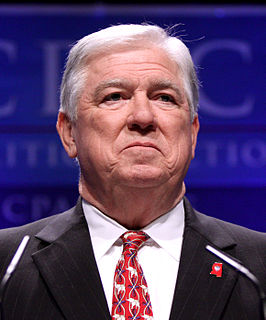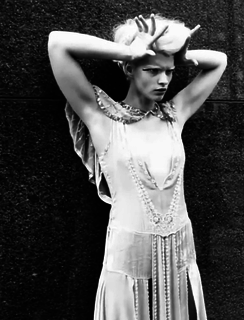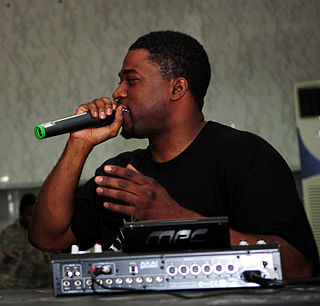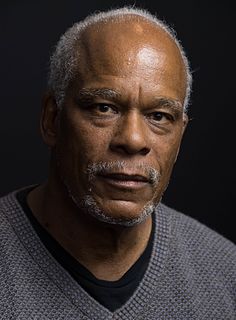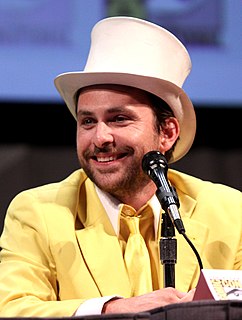Top 470 Mississippi Quotes & Sayings - Page 8
Explore popular Mississippi quotes.
Last updated on November 20, 2024.
Donald Trump's slogan: "Let's make America great again." And when I hear that, that seems to suggest there was a moment in the past when America really was great, you know, when women knew their places, when we could set dogs on black people in Mississippi, when young people went and sit in at lunch counters and were assaulted by others. That's about the death of memory. That's about memory being basically suppressed in a way that doesn't allow people to understand that there were things that happened in the past that we not only have to remember, we have to prevent from happening again.
The living do not see eternity, just as they don't see Everlost, but they sense both in ways that they don't even know. They don't feel the Everlost barrier set across the Mississippi River, and yet no one had ever dared to draw city boundaries that straddle both sides of its waters. The living do not see Afterlights, and yet everyone has had times when they've felt a presence near them - sometimes comforting, sometimes not - but always strong enough to make one turn around and look over one's shoulder.
Remember...this year has already seen more billion-dollar weather-related disasters than any year in US history. Last year was the warmest ever recorded on planet Earth. Arctic sea ice is near all-time record lows. Record floods from Pakistan to Queensland to the Mississippi basin; record drought from the steppes of Russia to the plains of Texas...This is what climate change looks like in its early stages.
Ninety-nine percent of girls want to be models because they believe it will mean that they are the most beautiful women in the world. They think that they will wear expensive clothes, makes loads of money, travel a lot and have a rock star for a boyfriend. This never interested me. I didn't want anyone to scream out my name. I wanted to make art, to create an image with a photographer. And yes, I wanted to get out of Clinton, Mississippi - a small town that was so closed-minded you can't even imagine.
The only thing I really feel is necessary is that the black people, not only in Mississippi, will have to actually upset this applecart. What I mean by that is, so many things are under the cover that will have to be swept out and shown to this whole world, not just to America. This thing they say of "the land of the free and the home of the brave" is all on paper. It doesn't really mean anything to us. The only way we can make this thing a reality in America is to do all we can to destroy this system and bring this out to the light that has been under the cover all these years.
I've known people that was a part of a family and always feel that the family liked everyone else but them. That hurts, and that's as deep a hurt as you can possibly get. I've known people that would have problems with their love life. This is kind of how blues began - out of feeling misused, mistreated. Feeling like they had nobody to turn to. Blues don't necessarily have to be sung by a person that came from Mississippi as I did, because there are people having problems all over the world.
Living in Montgomery, I've been antagonized by the emergence of a narrative about our history that I believe is quite false and misleading, and actually dangerous. And the narrative that emerges when you spend time in the South - places likes Alabama, Georgia, Mississippi, Louisiana - is that we have always been a noble, wonderful, glorious region of the country, with wonderful, noble, glorious people doing wonderful, noble, glorious things. And there's great pride in the Alabamians of the nineteenth century.
Her family had no such ties. She was able to forge her way into that world. And then to those people, the idea of going to Arkansas, if you're gonna stop and think about it, you don't do it. It wouldn't have made any sense. It's like going to Mississippi. Why would you go to Alabama? You wouldn't go. You wouldn't... That would be throwing your life away! [...] For some reason, Hillary Clinton wanted to latch on to this guy [Bill Clinton] - and for some reason, this guy wanted her to latch on to him.
I'm pretty sure I can say that no one in my family ever asked Demetrie what it felt like to be black in Mississippi, working for our white family. It never occurred to us to ask. It was everyday life. It wasn't something people felt compelled to examine. I have wished, for many years, that I'd been old enough and thoughtful enough to ask Demetrie that question. She died when I was sixteen. I've spent years imagining what her answer would be. And that is why I wrote this book.
I used to come out here every Fourth of July as a child to picnic and to swim on the island, to tour the fort and wander through it. And all of that time, I never knew anything about the presence of black soldiers on the island. And so, for me, this was a way of trying to tell another history, a lost or a forgotten or a little-known history about these black soldiers who played an important part in American history.” Trethewey said.
Coincidentally, she was born “exactly 100 years to the day that Mississippi celebrated the first Confederate Memorial Day, April 26, 1866.
From earliest times, water has always been acknowledged as a primary human good and an indispensable natural resource. Around the great rivers of the world, like the Mississippi, great cultures have developed, while over the course of the centuries the prosperity of countless societies has been linked to these waterways. Today, however, the great fluvial systems of every continent are exposed to serious threats, often as a result of man's activity and decisions.
Back when we was in school in Mississippi, we had Little Black Sambo. That's what you learned: Anytime something was not good, or anytime something was bad in some kinda way, it had to be called black. Like, you had Black Monday, Black Friday, black sheep... Of course, everything else, all the good stuff, is white. White Christmas and such.
I am aware of the changes, but in no sense am I believer that we live in a post-racial society. That's a description of our inheritance and that is theirs, which is inescapable. It is doesn't matter if you are from New England or Mississippi. You're an American. It doesn't matter if you are white, black, brown, or Asian. It is part of American society. You'd have to be blind, deaf, or dumb not to know it. The emphasis on color or the fear of it, is all part of the same dark flower. I am trying to point to that and to bring it all the way back from Senegal.
To secure the safety of the navigation of the Mississippi River I would slay millions. On that point I am not only insane, but mad... I think I see one or two quick blows that will astonish the natives of the South and will convince them that, though to stand behind a big cottonwood and shoot at a passing boat is good sport and safe, it may still reach and kill their friends and families hundreds of miles off. For every bullet shot at a steamboat, I would shoot a thousand 30-pounder Parrots into even helpless towns on Red, Ouachita, Yazoo, or wherever a boat can float or soldier march.
. . .in August in Mississippi there’s a few days somewhere about the middle of the month when suddenly there’s a foretaste of fall, it’s cool, there’s a lambence, a soft, a luminous quality to the light, as though it came not from just today but from back in the old classic times. It might have fauns and satyrs and the gods and---from Greece, from Olympus in it somewhere. It lasts just for a day or two, then it’s gone. . .the title reminded me of that time, of a luminosity older than our Christian civilization.
The nation is sick; trouble is in the land, confusion all around...But I know, somehow, that only when it is dark enough can you see the stars. And I see God working in this period of the twentieth century. Something is happening in our world. The masses of people are rising up. And wherever they are assembled today, whether they are in Johannesburg, South Africa; Nairobi, Kenya; Accra, Ghana; New York City; Atlanta, Georgia; Jackson, Mississippi; or Memphis, Tennessee, the cry is always the same: 'We want to be free.'
Unfortunately, I saw a side of humanity I wish I'd remained blissfully ignorant of, including one driver who threw a bottle at me while I was walking my baby to the doctor on the side of the road and yelled out insults. Nurses who made nasty comments about how I should get a job (I was working two of them, in addition to being a published author). It wasn't that I didn't have a job and wasn't working. The jobs in backwoods Mississippi didn't pay enough to cover living expenses.
I have a dream that one day on the red hills of Georgia, sons of former slaves and sons of former slave-owners will be able to sit down together at the table of brotherhood. I have a dream that one day, even the state of Mississippi, a state sweltering with the heat of injustice, sweltering with the heat of oppression, will be transformed into a oasis of freedom and justice. I have a dream my four little children will one day live in a nation where they will not be judged by the color of their skin but by content of their character. I have a dream today!
I was born in Jackson, Mississippi, in 1969, in a time and place where no one was saying, 'Look how far we've come,' because we hadn't come very far, to say the least. Although Jackson's population was half white and half black, I didn't have a single black friend or a black neighbor or even a black person in my school.
My concern was first, for the black people of Mississippi, then I became concerned for black people nationwide, now my concern is for black people all over the world. I began to realize that it's not as much about race as we think it is. It's about the rich vs. the poor. I feel as if the different races are pitted against one another so we won't see the bigger (financial disparity) problem.
There is now a patent restricting the use of an herb called philantis neruri for curing jaundice. An even more blatant example is the use of turmeric for healing wounds, which is something every mother and grandmother does in every home in India. Now the Mississippi Medical Center claims to have "invented" the capacity of turmeric to heal wounds.
I grew up in Memphis, Tennessee; I went to college in New Orleans before moving to New York City for graduate school. Both sets of my grandparents grew up in rural Mississippi and brought a lot of agrarian knowledge to Memphis, which is an urban center in the South. Both sets had amazing backyard gardens. My paternal grandfather, practically every inch of available space was green.
I call this my church house trilogy. Souls' Chapel really was music from the Mississippi Delta, which to me is a church within itself. The Delta is the church of American Roots music. The Badlands is a cathedral without a top on it. And the Ryman has been called the Mother Church of Country Music, but to me it's the Mother Church of American Music. If you can think it up, it's been done there. In my mind, this is kind of a spiritual odyssey as much as anything else, and I had the settings of three churches to make it in.
I would get songs sung to me, like 'Old Man River, 'or kids would call me Mississippi and things like that. At the time, I wished I had a name that blended in more with my surroundings. Now, though, I've really learned to love it. From fifteen, I really liked it. It felt appropriate. Before that, I don't think it quite fitted me. I had to grow into it.
For example, John Law's Mississippi Company venture printed shares, and the money had gone up in smoke when it had been inscribed objects. The inscription made it magic and changed its meaning. That's how objects become charmed in The Arabian Nights, and they are often originally ordinary objects. The carpet is an ordinary, paltry object. The lamp is a rusty old lamp, and the bottles jinns are imprisoned within are old bottles. They are changed by the magic and the jinn's presence, and the jinn's presence is often embodied in the seal or inscription.
My personal beliefs were shaped more by experience and by watching the news when I was young: images of angelic-looking college students in Mississippi crying like the world was ending because black people were being allowed on their campus; the slow mounting horror of Vietnam on the evening news every night; sitting with my parents in front of the TV and being appalled at the way the Chicago police were treating the protesters during the '68 Democratic convention. Being eyed with suspicion because of my age and the way I wore my hair.
The 20th of March in 1964, I went before the Secretary of State to qualify to run as an official candidate for Congress from the 2nd Congressional District, and it was easier for me to qualify to run than it was for me to pass the literacy test to be a registered voter. And we had four people to qualify and run in the June primary election be we didn't have enough Negroes registered in Mississippi.
If we want to understand the actions of a man in the early 1860's, put yourself back there in his shoes. As a young man he began piloting steamboats on the Mississippi, a job he loved and wanted to do the rest of his life, he said. The Civil War ended traffic on the River and his job. He wrote about it in A History of A Campaign That Failed. He said: "I joined the Confederacy, served for two weeks, deserted, and the Confederacy fell." His attachment to the Southern ideal of slavery does not appear very sturdy.
Usually we look at it like, "Oh, black people couldn't vote in Mississippi because they had to take a literacy test." But one of the things you learn in the film is that there were major consequences for even trying to vote. You could be killed for trying to vote. You could definitely be fired from your job and many were, which is why so few black Mississippians even attempted to register early on. They put your name in the newspaper if you tried to register to vote.
We must educate and train our children to compete and succeed in the 21st century. Our kids are not going to grow up to compete with children in Alabama or Mississippi. They're going to grow up to compete with kids in India, and China, all over the world; children who are learning to compete and succeed in the 21st century themselves.
New Jersey boasts the highest percentage of passport holders (68%); Delaware (67%), Alaska (65%), Massachusetts (63%), New York (62%), and California (60%) are close behind. At the opposite end of the spectrum, less than one in five residents of Mississippi are passport holders, and just one in four residents of West Virginia, Kentucky, Alabama, and Arkansas.
My wife is from Laurel, Mississippi, and she has a lot of relatives down in Louisiana, Baton Rouge, and Shreveport, Louisiana. We go down there a lot. We got married in New Orleans. She has a cousin who introduced me to swamp pop, which is sort of zydeco/Cajun music with a little uptempo pop swing. Now I'm a big zydeco fan, I'm a big swamp-music fan.
I would sit on the street corners in my hometown of Indianola, Mississippi, and I would play. And, generally, I would start playing gospel songs. People would come by on the street - you live in Time Square, you know how they do it - they would bunch up. And they would always compliment me on gospel tunes, but they would tip me when I played blues.
To the Baptist Churches on Neal's Greek on Black Creek, North Carolina I have received, fellow-citizens, your address, approving my objection to the Bill containing a grant of public land to the Baptist Church at Salem Meeting House, Mississippi Territory. Having always regarded the practical distinction between Religion and Civil Government as essential to the purity of both, and as guaranteed by the Constitution of the United States, I could not have otherwise discharged my duty on the occasion which presented itself
It's not enough to celebrate the ideals that we're built on, liberty and justice and equality for all. Those just can't be words on paper, the work of every generation is to make those words mean something, concrete in the lives of our children. And we won't get there as long as kids in Baltimore or Ferguson or New York or Appalachia or the Mississippi delta or the Pine Ridge reservation believe that their lives are somehow worthless.
I consider myself a progressive, so my answer would be that we need to be progressive. For some reason the people in power in Mississippi still seem to be invested in these very American myths."The individual is alone." "We pull ourselves up by our bootstraps." "We create success for ourselves, and if we work hard enough then we will succeed and have success beyond our wildest dreams." I think that we need to do away with that kind of thinking and be more aware of history and how the history of this place bears in the present and how it affects people.
Liberals believe that crime is inextricably linked with poverty. In reality, most poor people never resort to crime, and some wealthy people commit evil acts to enrich themselves further. Harlem, East Los Angeles, the South side of Chicago are not the poorest communities in the United States. According to a new U.S. Bureau of the Census report, the poorest communities are Shannon County, South Dakota, followed by Starr, Texas, and Tunica, Mississippi. Have you ever heard of these residents rioting to protest their living conditions?
One of the things I remember as a child: There was a man named Joe Pulliam. He was a great Christian man; but one time, he was living with a white family and this white family robbed him of what he earned. They didn't pay him anything. This white man gave him $150 to go to the hill, (you see, I lived in the Black Belt of Mississippi)... to get another Negro family. Joe Pulliam knew what this white man had been doing to him so he kept the $150 and didn't go.
Actually, when I think about growing up, I feel most affected by two travels that I made working in cargo boats when I was 16 and 18. One of them crossed through the Mississippi and Baton Rouge and Mobile, Alabama, and another went all the way to Europe. On the last trip, I stayed in Europe for one year with $1,000, working everywhere I could, doing everything. Those years shaped me a lot and taught me the value of exploring different things.
I've known rivers: I've known rivers ancient as the world and older than the flow of human blood in human veins. My soul has grown deep like the rivers. I bathed in the Euphrates when dawns were young. I built my hut near the Congo and it lulled me to sleep. I looked upon the Nile and raised the pyramids above it. I heard the singing of the Mississippi when Abe Lincoln went down to New Orleans, and I've seen its muddy bosom turn all golden in the sunset. I've known rivers: Ancient, dusky rivers. My soul has grown deep like the rivers.
I do remember, one time, a man came to me after the students began to work in Mississippi and he said the white people were getting tired and they were getting tense and anything might happen. Well, I asked him "how long he thinks we had been getting tired"? I have been tired for 46 years and my parents was tired before me and their parents were tired, and I have always wanted to do something that would help some of the things I would see going on among Negroes that I didn't like and I don't like now.
When I say I love Eastland, it sounds preposterous a man who brutalizes people. But you love him or you wouldn't be here. You're going to Mississippi to create social change and you love Eastland in your desire to create conditions which will redeem his children. Loving your enemy is manifest in putting your arms not around the man but around the social situation, to take power from those who misuse it at which point they can become human too.
Take Washington, D.C., which spends over $10,000 per student for education whose student achievement would be dead last if Mississippi chose to secede from the Union. Suppose Washington gave each parent even a $5,000 voucher - that wouldn't mean less money available per student. To the contrary, holding total education expenditures constant, it'd mean more money per student remaining in public schools.
I am thankful for the strong, united response of our university community to the desecration of the James Meredith statue last year, confirming our university values of civility and respect. what it is saying is that the only possible justice for a black in the state of Mississippi is the federal government and if there's anything that we don't need it's that being our only means of expecting justice.
I'm writing about the things I see all around me. Growing up in Mississippi, I've seen how these backward ideas about class and race and healthcare and education and housing and racism impact everyday lives. For example, my mother wouldn't let me go to my homecoming dance because the yacht club where they were having the dance threw a fundraiser for David Duke, an ex-Klan member, when he was running for governor of Louisiana. So I grew up seeing how personal politics could be.
There were colored and white waiting rooms everywhere, from doctor's offices to the bus stations, as people may already know. But there were actually colored windows at the post office in, for example, Pensacola, Florida. And there were white and colored telephone booths in Oklahoma. And there were separate windows where white people and black people would go to get their license plates in Indianola, Mississippi. And there were even separate tellers to make your deposits at the First National Bank in Atlanta.



